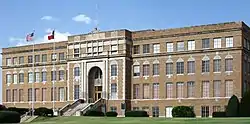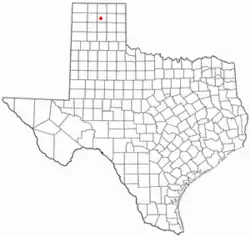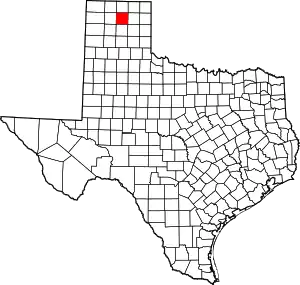Stinnett, Texas
Stinnett (/stɪˈnɛt/ sti-NET) is a city in and the county seat of Hutchinson County, Texas, United States.[5] The population was 1,881 at the 2010 census,[6] a decrease from 1,936 at the 2000 census.
Stinnett, Texas | |
|---|---|
 Hutchinson County Courthouse | |
 Location of Stinnett, Texas | |
 | |
| Coordinates: 35°49′23″N 101°26′37″W | |
| Country | United States |
| State | Texas |
| County | Hutchinson |
| Area | |
| • Total | 1.98 sq mi (5.14 km2) |
| • Land | 1.98 sq mi (5.14 km2) |
| • Water | 0.00 sq mi (0.00 km2) |
| Elevation | 3,176 ft (968 m) |
| Population (2010) | |
| • Total | 1,881 |
| • Estimate (2019)[3] | 1,770 |
| • Density | 892.14/sq mi (344.44/km2) |
| Time zone | UTC-6 (Central (CST)) |
| • Summer (DST) | UTC-5 (CDT) |
| ZIP code | 79083 |
| Area code | 806 |
| FIPS code | 48-70340 [4] |
| GNIS feature ID | 2411984[2] |
| Website | cityofstinnett.com |
History
Stinnett was established in 1926[7] by A.P. (Ace) Borger, better known as the founder of Borger, a larger community in the county, and his brother Lester Andrew (Pete) Borger.[8] In September 1926, Stinnett replaced Plemons, which later became a ghost town, as the Hutchinson County seat. The courthouse, built in 1927 in the Spanish Renaissance style, was financed from petroleum money. The structure, designed by the architect W.F. Townes, consists of brown brick and cut white stone.[9]
Geography
According to the United States Census Bureau, the city has a total area of 2.0 square miles (5.2 km2), all land.
Climate
According to the Köppen climate classification system, Stinnett has a semiarid climate, BSk on climate maps.[10]
Demographics

| Census | Pop. | Note | %± |
|---|---|---|---|
| 1930 | 377 | — | |
| 1940 | 635 | 68.4% | |
| 1950 | 1,170 | 84.3% | |
| 1960 | 2,695 | 130.3% | |
| 1970 | 2,014 | −25.3% | |
| 1980 | 2,222 | 10.3% | |
| 1990 | 2,166 | −2.5% | |
| 2000 | 1,936 | −10.6% | |
| 2010 | 1,881 | −2.8% | |
| 2019 (est.) | 1,770 | [3] | −5.9% |
| U.S. Decennial Census[11] | |||
2020 census
| Race | Number | Percentage |
|---|---|---|
| White (NH) | 1,268 | 76.85% |
| Black or African American (NH) | 15 | 0.91% |
| Native American or Alaska Native (NH) | 23 | 1.39% |
| Asian (NH) | 3 | 0.18% |
| Some Other Race (NH) | 2 | 0.12% |
| Mixed/Multi-Racial (NH) | 95 | 5.76% |
| Hispanic or Latino | 244 | 14.79% |
| Total | 1,650 |
As of the 2020 United States census, there were 1,650 people, 521 households, and 367 families residing in the city.
2000 census
At the 2000 census, 1,936 people, 765 households, and 554 families lived in the city. The population density was 972.8 inhabitants per square mile (375.6/km2). The 870 housing units averaged 437.2/sq mi (168.8/km2). The racial makeup of the city was 91.58% White, 0.26% African American, 1.29% Native American, 0.21% Asian, 3.98% from other races, and 2.69% from two or more races. Hispanics or Latinos of any race were 7.54%.[4]
Of the 765 households, 36.1% had children under the age of 18 living with them, 56.6% were married couples living together, 11.0% had a female householder with no husband present, and 27.5% were not families. About 26.1% of households were one person and 13.2% were one person aged 65 or older. The average household size was 2.49 and the average family size was 2.98.
The age distribution was 27.9% under the age of 18, 7.7% from 18 to 24, 27.1% from 25 to 44, 22.5% from 45 to 64, and 14.7% 65 or older. The median age was 37 years. For every 100 females, there were 101.5 males. For every 100 females age 18 and over, there were 96.8 males. The median household income was $33,387 and the median family income was $42,969. Males had a median income of $35,395 versus $18,750 for females. The per capita income for the city was $16,242. About 7.9% of families and 10.6% of the population were below the poverty line, including 15.4% of those under age 18 and 7.5% of those age 65 or over.
Education
The City of Stinnett is served by the Plemons-Stinnett-Phillips Consolidated Independent School District. It was a part of the Stinnett Independent School District until July 1, 1987, when it merged into the PSP CISD.[15]
Notable person
- Donny Anderson, former NFL player, though born in Borger, he graduated in 1961 from Stinnett High School.
References
- "2019 U.S. Gazetteer Files". United States Census Bureau. Retrieved August 7, 2020.
- U.S. Geological Survey Geographic Names Information System: Stinnett, Texas
- "Population and Housing Unit Estimates". United States Census Bureau. May 24, 2020. Retrieved May 27, 2020.
- "U.S. Census website". United States Census Bureau. Retrieved 2008-01-31.
- "Find a County". National Association of Counties. Archived from the original on May 31, 2011. Retrieved 2011-06-07.
- "Stinnett, TX Population - Census 2010 and 2000 Interactive Map, Demographics, Statistics, Quick Facts - CensusViewer". censusviewer.com. Retrieved 2018-02-27.
- STINNETT, TX from the Handbook of Texas Online
- BORGER, ASA PHILLIP from the Handbook of Texas Online
- Texas Historical Commission marker at Hutchinson County Courthouse, Stinnett, Texas
- Climate Summary for Stinnett, Texas
- "Census of Population and Housing". Census.gov. Retrieved June 4, 2015.
- "Explore Census Data". data.census.gov. Retrieved 2022-05-20.
- https://www.census.gov/
- "About the Hispanic Population and its Origin". www.census.gov. Retrieved 18 May 2022.
- "CONSOLIDATIONS, ANNEXATIONS AND NAME CHANGES FOR TEXAS PUBLIC SCHOOLS" (PDF). Texas Education Agency. 2018-09-10. Retrieved 2019-10-30.
